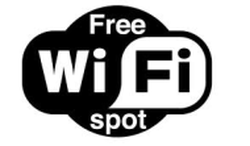Using Free Wi-Fi? Connect With Care

If you are traveling this summer, chances are you’ll encounter a Wi-Fi hotspot (network).
Wi-Fi in airports, hotels, train stations, coffee shops, and other public places can be convenient, but often these hotspots are not secure, and can leave you at risk.
Whether you’re entertaining the kids by streaming a video on a tablet, downloading new travel applications on your smartphone or even taking your tablet poolside, there are precautions you should take to make sure your personal information is safe.
First and foremost, connect with care. If you're online through an unsecured network, you should be aware that individuals with malicious intent may have established a Wi-Fi network to eavesdrop on your connection. This could allow them to steal your credentials, financial information, or other sensitive and personal information. It’s also possible that they could infect your system with Malware. Any free Wi-Fi should be considered “unsecure.” Therefore, be cautious about the sites you visit and the information you release.
STOP. THINK. CONNECT.
Here are 7 tips to remember when using Wi-Fi:
- Keep your computer and mobile devices updated. Having the latest version of security software, operating system, web browser and application can help protect you from malware and other threats you may encounter when using Wi-Fi.
- Don’t assume that the Wi-Fi connection is secure. Many hotspots don’t encrypt the information you send on the Wi-Fi network.
- Do not log into accounts, especially financial accounts, when using public wireless networks.
- Do not log onto sites that seem suspicious (clues include the URL being misspelled or not matching the name that you were given by the place of business). It’s not uncommon for cybercriminals to set up a Wi-Fi network called “free Wi-Fi” in airports, hotels, and other public places.
- A cellular 3G/4G connection is generally safer than a Wi-Fi connection.
- Consider turning off features on your computer or mobile devices that allow you to automatically connect to Wi-Fi.
- Consider using a mobile firewall software such as GFI's Viper Mobile on your Android or IOS device
For additional information, please visit:
- OnGuardOnline.gov: Tips for Using Public Wi-Fi Networks
- US CERT: Cyber Threats to Mobile Phones
- US CERT: Holiday Traveling with Personal Internet-Enabled Devices
- Microsoft Security: Four Safety Tips for Using Public Wi-Fi
